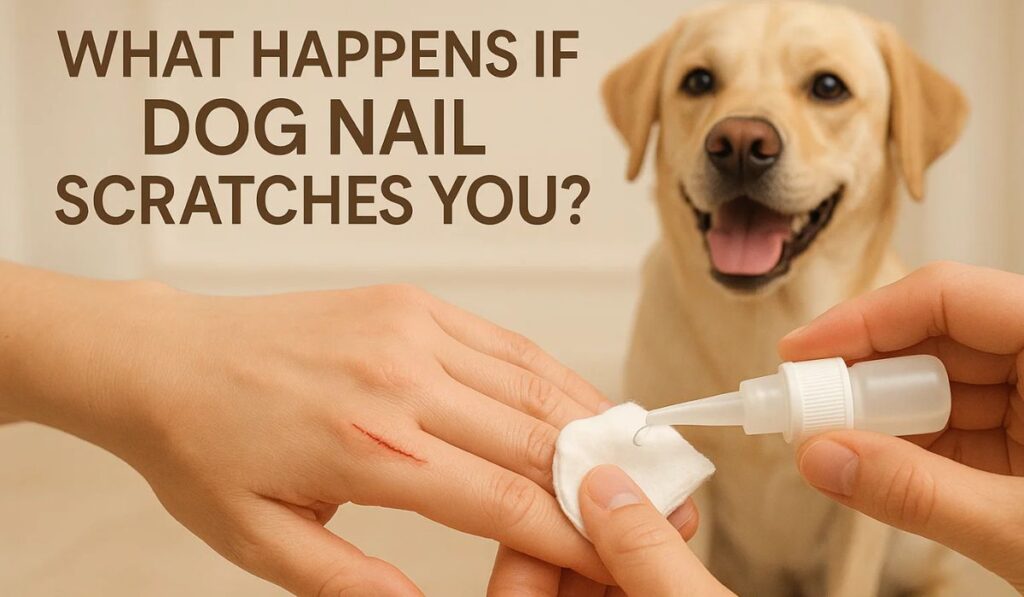Table of Contents
Dogs are loving, playful, and friendly — but sometimes, during playtime or excitement, they may accidentally scratch you with their nails.
A dog scratch with nails may look small, but it can sometimes lead to redness, swelling, or infection if not cleaned properly.

In this article, we’ll explain what happens if dog nail scratches you, how to care for it at home, and when to see a doctor.
Let’s understand everything step by step.
What Happens If a Dog Nail Scratches You?
A dog nail scratch happens when your pet’s sharp nail breaks your skin. It can range from a small surface scratch to a deeper cut that bleeds slightly.
Even though dogs are not trying to hurt us, their nails can carry dirt, germs, or bacteria — especially if they walk outside or scratch other surfaces.
Here’s what might happen depending on the depth of the scratch:
1. Mild Scratches (Surface Only)
If your skin is only lightly scratched, it might look red or slightly irritated.
👉 It usually heals on its own in a few days with proper cleaning.
2. Moderate Scratches (Tiny Bleeding)
If the nail breaks your skin, bacteria can enter the wound and cause infection if not cleaned quickly.
👉 You might see redness, mild swelling, or pain around the area.
3. Deep Scratches or Punctures
If your dog’s nail causes a deep wound, there’s a higher risk of infection or tetanus, especially if the dog’s nails were dirty.
👉 You should visit a doctor for proper treatment and possibly a tetanus shot if your vaccination isn’t up to date.
Why You Shouldn’t Ignore a Dog Nail Scratch
Many people think, “It’s just a small scratch — it will heal on its own.”
But here’s why you should take every dog nail scratch seriously:
- Bacteria and Germs:
Dogs often have bacteria like Pasteurella and Staphylococcus on their paws and nails. These can enter your skin through scratches. - Tetanus Risk:
If you haven’t had a tetanus booster in the last 5–10 years, even a dog scratch with nails can put you at risk. - Cat Scratch Disease (Rare in Dogs):
Though rare, dogs can sometimes carry bacteria like Bartonella, which may cause fever or swollen lymph nodes. - Allergic Reaction:
Some people’s skin reacts strongly to pet scratches, causing itching or redness.
So yes — even if it looks small, dog nail scratches should always be cleaned and monitored.
Dog Nail Scratch Treatment at Home
If your scratch is mild and not bleeding heavily, you can easily take care of it at home.
Here’s a simple dog nail scratch treatment you can follow:
Step 1: Wash Your Hands
Before touching the wound, wash your hands with soap and water to avoid adding more germs.
Step 2: Clean the Scratch
Use mild soap and running water to clean the area gently.
You can also use an antiseptic solution like Dettol or Betadine to kill bacteria.
Step 3: Stop Bleeding
If the scratch is bleeding, apply gentle pressure with a clean cloth or tissue for a few minutes until it stops.
Step 4: Apply an Antibiotic Ointment
After cleaning, apply a thin layer of antibiotic cream (like Neosporin or Soframycin) to prevent infection.
Step 5: Cover with a Bandage (If Needed)
For deeper or open scratches, cover the wound with a sterile bandage or plaster to keep it clean.
Change it daily until the wound closes.
Step 6: Monitor the Scratch
Watch for signs of infection such as:
- Redness or swelling
- Warmth around the scratch
- Pus or yellow discharge
- Increasing pain or fever
If you notice any of these, see a doctor immediately.
When to See a Doctor for Dog Nail Scratches
Most small scratches heal easily at home.
But you should see a doctor if:
- The scratch is deep, bleeding heavily, or not healing after a few days.
- You have swelling, pain, or pus.
- You develop fever or chills.
- You haven’t had a tetanus shot in the past 5 years.
- You have a weak immune system (diabetes, cancer treatment, etc.).
A doctor may prescribe antibiotics or a tetanus booster depending on the situation.
Tips to Prevent Dog Nail Scratches
Even though scratches are often accidental, you can reduce the chances of getting them by following these simple tips:
1. Trim Your Dog’s Nails Regularly
Keep your dog’s nails short. Long nails not only cause scratches but also make your pet uncomfortable.
2. File Sharp Edges
After trimming, use a pet nail file to smooth out sharp tips.
3. Train Your Dog Gently
Train your dog not to jump or paw at people during excitement or playtime.
4. Play Safely
When playing fetch or tug-of-war, wear long sleeves or use toys instead of hands.
5. Clean Dog Paws
Regularly wipe your dog’s paws after walks to reduce dirt and bacteria buildup.
By taking small steps, you can avoid painful dog nail scratches altogether.
Quick Facts About Dog Nail Scratches
| Fact | Explanation |
|---|---|
| Can dog nail scratches cause infection? | Yes, if not cleaned properly, bacteria can infect the wound. |
| Do you need a tetanus shot for a dog nail scratch? | Yes, if the scratch is deep and you haven’t had one in 5–10 years. |
| Can you get rabies from a dog nail scratch? | Rare, but possible only if the dog’s nails have saliva from a rabid bite. Seek medical advice immediately if in doubt. |
| How long do scratches take to heal? | Usually 3–7 days for mild ones, longer for deeper cuts. |
Home Remedies for Faster Healing
Along with proper cleaning, you can use a few natural remedies to help the skin heal faster:
- Aloe Vera Gel: Soothes irritation and promotes skin repair.
- Coconut Oil: Has antibacterial properties and keeps the area moisturized.
- Turmeric Paste: Acts as a natural antiseptic when applied thinly on the wound.
- Honey: Helps prevent infection and reduce inflammation.
(Always apply these after cleaning the wound properly.)
Final Thoughts
So, what happens if dog nail scratches you?
Usually, it’s not serious — but it can become a problem if ignored. Proper cleaning and care make all the difference.
Follow the right dog nail scratch treatment steps immediately, watch for infection signs, and visit a doctor if needed.
Remember, even though our furry friends mean no harm, dog nail scratches should always be treated with care.
Stay safe, play responsibly, and keep both you and your pet healthy!


